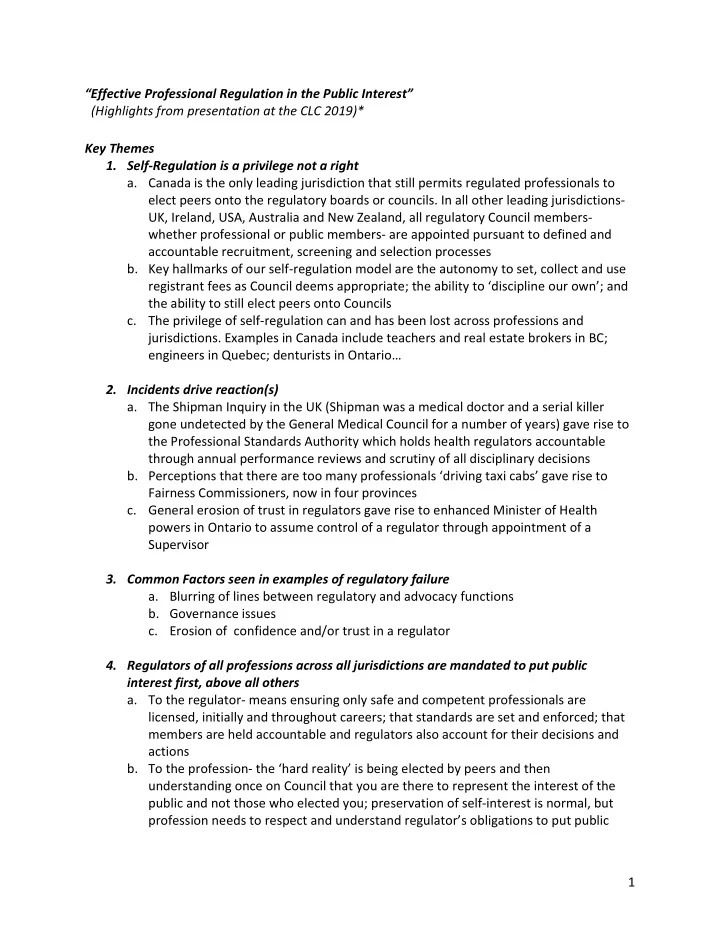

“Effective Professional Regulation in the Public Interest” (Highlights from presentation at the CLC 2019)* Key Themes 1. Self-Regulation is a privilege not a right a. Canada is the only leading jurisdiction that still permits regulated professionals to elect peers onto the regulatory boards or councils. In all other leading jurisdictions- UK, Ireland, USA, Australia and New Zealand, all regulatory Council members- whether professional or public members- are appointed pursuant to defined and accountable recruitment, screening and selection processes b. Key hallmarks of our self-regulation model are the autonomy to set, collect and use registrant fees as Council deems appropriate; the ability to ‘discipline our own’; and the ability to still elect peers onto Councils c. The privilege of self-regulation can and has been lost across professions and jurisdictions. Examples in Canada include teachers and real estate brokers in BC; engineers in Quebec; denturists in Ontario… 2. Incidents drive reaction(s) a. The Shipman Inquiry in the UK (Shipman was a medical doctor and a serial killer gone undetected by the General Medical Council for a number of years) gave rise to the Professional Standards Authority which holds health regulators accountable through annual performance reviews and scrutiny of all disciplinary decisions b. Perceptions that there are too many professionals ‘driving taxi cabs’ gave rise to Fairness Commissioners, now in four provinces c. General erosion of trust in regulators gave rise to enhanced Minister of Health powers in Ontario to assume control of a regulator through appointment of a Supervisor 3. Common Factors seen in examples of regulatory failure a. Blurring of lines between regulatory and advocacy functions b. Governance issues c. Erosion of confidence and/or trust in a regulator 4. Regulators of all professions across all jurisdictions are mandated to put public interest first, above all others a. To the regulator- means ensuring only safe and competent professionals are licensed, initially and throughout careers; that standards are set and enforced; that members are held accountable and regulators also account for their decisions and actions b. To the profession- the ‘hard reality’ is being elected by peers and then understanding once on Council that you are there to represent the interest of the public and not those who elected you; preservation of self-interest is normal, but profession needs to respect and understand regulator’s obligations to put public 1
interest first. Without the general support of the profession, the regulator will struggle to be effective and credible c. To the public- the public often only finds regulators when they have complaints or inquiries, and want redress when something goes wrong; trust in the regulator, and the profession is more likely where they are treated with fairness, transparency, and honesty. d. Professional advocacy groups/associations- the relationship with the regulator should be respective and cooperative but not collaborative (which suggests relations that are too close). There needs to be clear separation of advocacy and regulatory functions and activities and while agreement is ok, agreement on all issues is not e. Finding areas where public and professional interests truly intersect- examples include continuing professional development/quality assurance; embracing fairness, transparency, accountability in and for all 5. Challenges of Regulatory Leadership a. Taking the regulatory organization where it needs to go even where members want it to go elsewhere b. Doing the right things while also keeping relationships with Council, the profession, other stakeholders in a good place c. Council needs to hire the right Registrar/CEO to lead and guide them but must also empower and expect the Registrar to lead and guide 6. Challenges a. Clarity about ‘why’ the regulator exists is as or more important that what it does or how b. Roles and responsibilities- staff, council, committees, volunteers must be clear and respected c. Reputation and credibility once lost is very difficult to regain d. Having the capacity/ability to be agile and adapt to change is critical 7. Anticipating Change- be at the ‘front end of the train’! a. Governments are looking at and being guided by research and practices in other jurisdictions- External reviews of EGBC, Dentists (BC); College of Nurses and Ontario College of Teachers external governance reviews etc b. Jurisdictional practices in other leading jurisdictions- common themes: i. Smaller Council sizes (no larger than 12) ii. Equal representation of professional and public members iii. All members are appointed based on competencies and skills iv. Statutory committees (Complaints and Discipline) are independent, either from the regulatory Council (US, Ireland and UK) or completely independent from the regulator (Aust, NZ) v. Increased oversight re regulatory performance and decisions (Ireland, UK, Australia) 2
8. Right-Touch Regulation a. “Doing the right things, and doing them right” b. Regulation is guided by the following principles: i. Proportionality- using the right amount of enforcement needed ii. Risk based- quantify and qualify the risks iii. Outcomes focused- what are we trying to achieve? iv. Review and respond to change v. Regulate in an effective and credible manner while also effectively maintaining positive relations with key stakeholders 9. In Summary a. Keep abreast of regulatory trends and changes elsewhere b. If change is coming, lead it , don’t be led c. Ask the hard questions- is this decision or action (really) in the public interest? And explain in our decisions why or how this is the case * The presenter, Deanna Williams, is the President of Dundee Consulting Group Ltd. She is a former Registrar of the Ontario College of Pharmacists and was the Minister-appointed Supervisor to the College of Denturists of ON during the loss of its regulatory privileges in 2012 and 2013. She co -conducted the external performance review of the PEO in 2018/19. 3
Recommend
More recommend